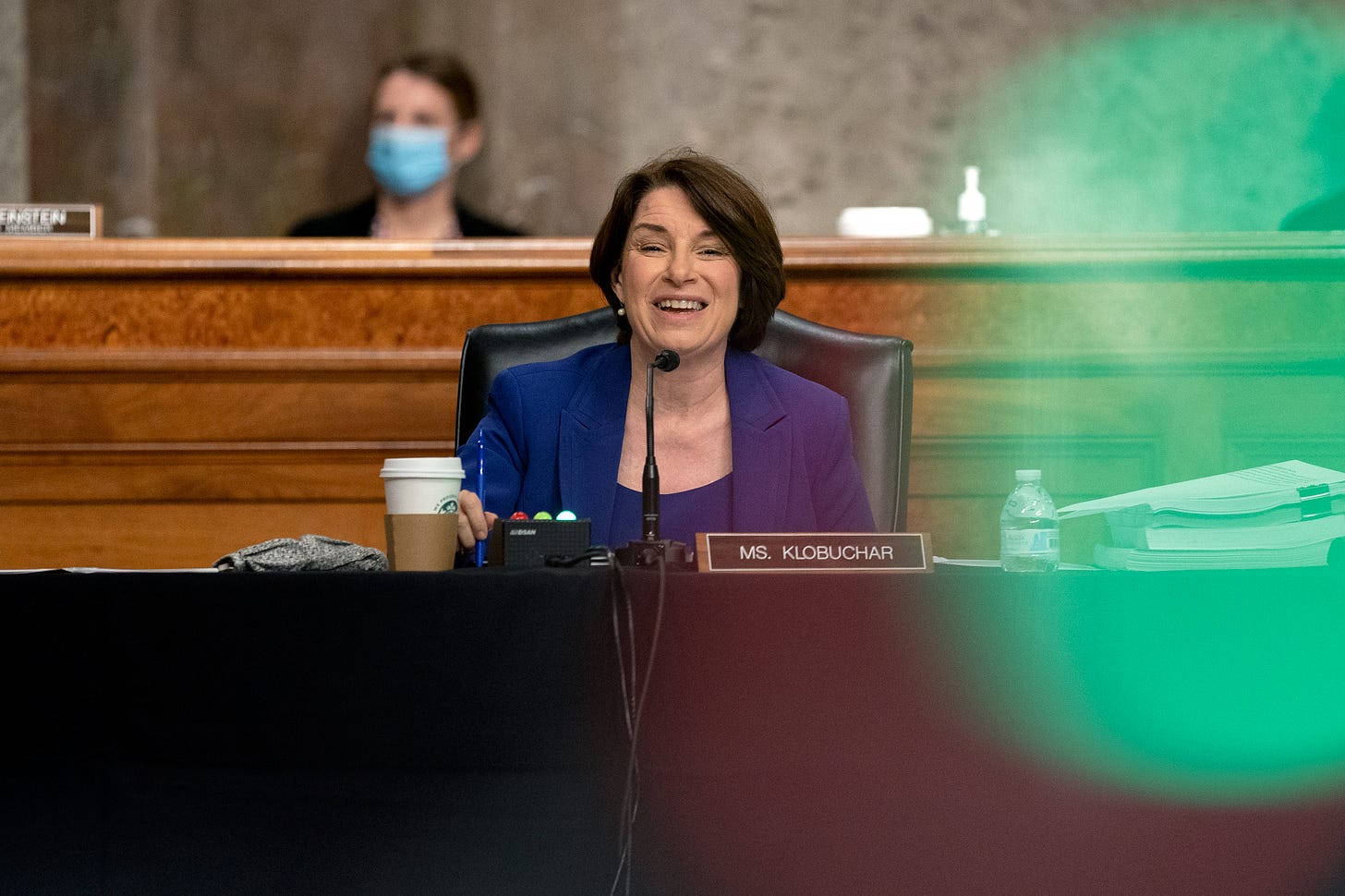Amy Klobuchar opposes the remote Senate confirmation hearings she helped make possible
A convenient about-face.

Related highlights:
—
Democrats are sticking with the line that the Senate cannot meet remotely for Judge Amy Coney Barrett’s Supreme Court confirmation hearings.
It just cannot be done, they say. It would simply be too unfitting for such an important lifetime appointment to the federal bench.
This is particularly rich coming from Democratic Senator and Senate Judiciary Committee member Amy Klobuchar of Minnesota, who helped make it possible for Senators to go remote for judicial confirmation hearings.
“Thank you for being willing to do a hybrid hearing like we’re seeing today,” the Minnesota Democrat said to Judiciary Committee Chairman Sen. Lindsey Graham of South Carolina on May 6 as she remotely joined the confirmation hearing of Judge Justin Walker to the U.S. Court of Appeals for the District of Columbia Circuit.
Klobuchar added that Republican Sen. Roy Blunt of Missouri and she “worked hard” on the Rules Committee to “get this done.”
“I’m glad we’re seeing senators there as well as remotely,” the senator said, speaking into her computer microphone.
But that was then. This is now. Now, Democrats, including Klobuchar herself, say they simply cannot meet in-person to do the Barrett hearings because of the recent surge in coronavirus cases in the nation’s capital. And the Senate cannot meet remotely either, Democrats say. Aw, shucks. Guess the Barrett confirmation will just have to wait indefinitely.
“This is for the highest court of the land,” Klobuchar said in a recent interview with Fox News’s Chris Wallace. “And, yes we have had virtual hearings. I helped to put them together. It's important to give senators that option. But you want to be able to go back and forth with this nominee. Given [Barrett’s] views on the Affordable Care Act … yes, we want to be able to ask her – ”
“Why can't you question Judge Barrett virtually?” interjected an incredulous Wallace.
“Again,” said the senator, “we believe you should have an in-person hearing. That doesn't mean the virtual option wouldn't be available, but why would you ram — I guess I turn the question around here ... why would you ram this through when we don't even have a COVID package done to make sure that people have health care, that we have the testing I just talked about, that we have the funding for that?”
So, what is the problem with meeting remotely to do the Barrett confirmation hearings? There isn't one. Democrats obviously don’t really oppose hybrid hearings, even for lifetime appointments to the federal bench. They certainly had no problem meeting remotely earlier this year.
On May 6, when the Senate Judiciary held a hearing on Walker’s nomination, Democratic Sens. Patrick Leahy of Vermont, Sheldon Whitehouse of Rhode Island, Klobuchar, and Mazie Hirono of Hawaii joined remotely. On May 20, the committee held a hearing on the nomination of Judge Cory Wilson to the Fifth Circuit. Democratic Sens. Whitehouse, Hirono, and Cory Booker of New Jersey joined remotely. On June 17, the committee held a hearing on the nominations of Brett H. Ludwig, John W. Holcomb, R. Shireen Matthews, and Todd Wallace Robinson to federal judgeships in Wisconsin and California. Democratic Sen. Bob Casey of Pennsylvania joined remotely. On June 24, the committee held a hearing on the nominations of David W. Dugan, Iain D. Johnston, Stephen P. McGlynn, Franklin Ulyses Valderrama, Hala Y. Jarbou, and Roderick Young to federal judgeship positions in Illinois, Michigan, and Virginia. Hirono again joined remotely.
The list goes on, but you get the picture. Senate Democrats had no problem with hybrid hearings until it became a convenient excuse to jam up the Barrett confirmation. And remember: Everything they say now about how meeting remotely “for a lifetime appointment to the federal bench” is “not an acceptable substitute” can be said about any of the judicial nominees whose hearings they joined remotely this summer. Those were all lifetime appointments, too. Guess it just did not matter then.
It is clear what is happening. This sudden distaste for meeting remotely for judicial nominations has nothing to do with public health and everything to do with the fact that President Trump and Senate Republicans are poised to put a third judge on the Supreme Court.



